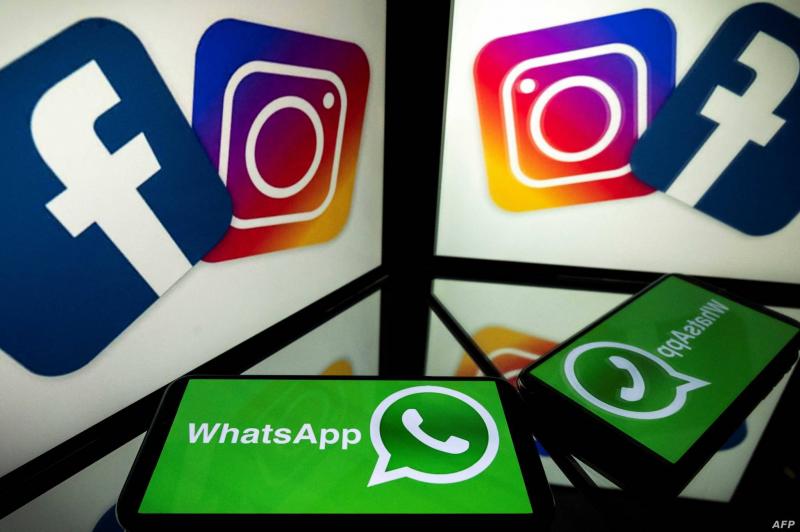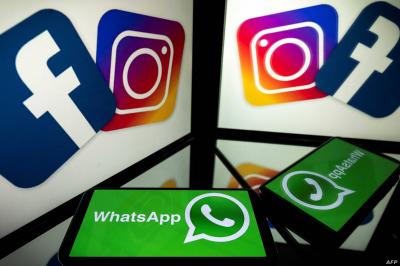In the six hours that the world lost connection via Facebook and its popular applications—Messenger, Instagram, and WhatsApp—what happened? How did people spend that time? From the first moment people realized these applications were down, their reactions were similar. Many joked, while others expressed deep boredom, raising the question of whether humans are prepared to live without social media. It seems difficult.
For Iraqi Lina (18 years old), "the world stopped." This is exactly how she felt during the six hours without Facebook, Instagram, and WhatsApp, describing herself as "living in a strange world," as she told Al-Hurra. Lina does not consider herself "addicted" to social media, especially Instagram, yet she spends a long time each day browsing the app. "I open my eyes to the notifications I get from Instagram, and its videos are the last thing I see before I sleep." Even during times when she should be engaging in other activities, like eating, studying, or sitting with family, "sneaking a glance" at the app and posts has become a necessary habit for Lina. "I didn't know what to do with my day, and after the first hour of the outage, I felt annoyed and irritable, even arguing with my mom several times." Lina confided to Al-Hurra that she "cried" when the app returned to service.
What does Lina's experience signify? According to psychologists, this attachment bears "pathological traits," as Dr. Maha Al-Sudani, a neurologist and addiction specialist at a Baghdad hospital, explains. Dr. Al-Sudani tells Al-Hurra that "addiction to social media is very real and a disease that is difficult to overcome, impacting people's lives dangerously." She adds, "Social media activates the same brain centers that process strong stimuli like exercise, religious faith, or fanaticism." She points out that "the brain's secretions during social media browsing are similar to those released by the gambling glands—though in lesser quantities—or those stimulated by drugs—also in lesser proportions." However, these levels, combined with "behavioral stimulation" of holding the phone and flipping through posts, "make the habit attached to human consciousness, triggering addictive behaviors." Dr. Al-Sudani confirms that "people can become addicted to behaviors" such as fidgeting with a worry stone, cracking knuckles, or nail-biting. If behavioral habits are combined with chemical stimulants received by the brain, "quitting becomes more challenging, and withdrawal symptoms manifest if a person is forced to abandon these behaviors."
This leads to emotional responses: "The person becomes emotionally charged, agitated, and easily provoked or angered," Dr. Al-Sudani continues. For Lina and her peers among the younger generation, social media is all they know, and it may be easy for them to imagine a world without it.
However, others, like Ahmad Al-Zubaidi (45 years old), also suffered due to the outage for the same reason. Ahmad tells Al-Hurra that "it was hard to return to a pre-social media world," but he admits he "enjoyed that period of rest, as Facebook sometimes makes you irritable because of all the opinions you read daily." The outage occurred "due to technical reasons" that remain unclear. Its timing raises concerns, especially as the Federal Trade Commission is suing the site for monopolistic practices by "acquiring Instagram and WhatsApp to ensure its dominance," and as EU policymakers draft regulations to curb the company's power, according to The New York Times.
Criticism of Facebook has escalated in recent weeks after whistleblower Frances Haugen shared internal documents indicating, among other things, that the company was aware that Instagram exacerbated "body image issues among teenagers." She also revealed that Facebook had a "two-tiered system of justice." Her disclosures drew criticism from regulators and the public alike. Congress heard from Haugen on Tuesday, the day after the "big outage," as it has been termed, when Facebook went down. Haugen revealed during a U.S. congressional hearing on protecting children from the dangers of the internet and social media that Facebook was aware of the risks its operations posed to children, pointing out that there were 600,000 accounts of children on the platform that should not exist. The former content manager at Facebook urged the U.S. government to take action against the company to compel it to change its practices. Haugen, who left her job last May, confirmed that Facebook spread misinformation and promoted hate, misleading children as a result.
Much recent criticism of Facebook has focused on decisions made—or not made—by company leaders about profiting from their platforms, according to the report. The scale of Facebook means that many people are affected when there are technical mishaps like the one the company claimed was responsible for the outage on Monday. While discussions are ongoing in the U.S. and Europe about regulatory actions to rein in the Facebook empire and other social media platforms, consumers in the Middle East appear powerless against changes that directly affect their lives or even their political future.
Losses were significant; Iraqi youth Ahmad, a candidate in the upcoming elections, was planning a live broadcast featuring a popular Iraqi Facebook personality to attract voters when the outage occurred. According to Ahmad, "this method is common for reaching people," including voters in his district, but the downtime "caused me to miss an appointment I'd been preparing for days." Ahmad paid a notable amount to the famous figure for their appearance and hosting of the election show, while also granting Ahmad an opportunity to speak to about 500,000 followers of this personality. The popular figure (who declined to be named) lost around $750 for ten minutes of broadcasting, claiming he usually earns between $2,000 to $7,000 per day, especially during busy "seasons," including election season.
Feeling the financial impact as well, Mohsen Al-Saffar, an online vendor with a Facebook page for marketing his products, expressed concern. He stated to Al-Hurra that he invested about $150,000 in the items he sells on his page, achieving daily sales of about $5,000, but the outage "made his heart race in fear." Al-Saffar does not own a physical store to sell his products, saying, "I don't want to pay rent, electricity bills, or risk theft; people are buying online these days," and if the internet is down, it means "everything has stopped."
The outage of Facebook, Instagram, WhatsApp, and Facebook Messenger "affected billions of users," according to Down Detector. Facebook confirmed that its stocks fell by about five percent due to the service outage and stated that "there is no evidence that user data was breached as a result of this disruption." However, despite its brevity, the outage's impact was significant, as Facebook's services are vital for many businesses worldwide, with users complaining about losing their sources of income. Additionally, Facebook accounts are commonly used to log into other sites that faced additional issues due to the company's technical failure. Meanwhile, competing messaging services reported increased traffic benefiting from the disruptions caused by WhatsApp and Messenger going down.
Telegram, for instance, surged from the 56th to the 5th place in the most downloaded free apps in the U.S. within a day, according to Sensor Tower. Another striking effect was that many domain registration companies listed Facebook.com as available for purchase. Cybersecurity expert Brian Krebs noted, "There was absolutely no reason to believe that Facebook.com would be up for grabs because of this, but it's fun to think about the billions of dollars it could fetch on the open market."
The New York Times reported that globally, an average of 2.76 billion people used at least one of Facebook's apps daily in June this year, with WhatsApp sending over 100 billion messages daily. It has been downloaded nearly six billion times since Facebook acquired it in 2014, according to estimates from data company Sensor Tower.
More serious cases resulting from the Facebook outage included unmet emergencies and incidents of abuse against women in impoverished areas lacking phone service, yet having internet access, among other regions worldwide. The company reportedly lost about $5 to $7 billion in value due to the outage, and founder Mark Zuckerberg's net worth decreased by four percent as a result. There are growing technical concerns that the outage caused dysfunctions in the protection system, potentially jeopardizing the data of millions of users.




